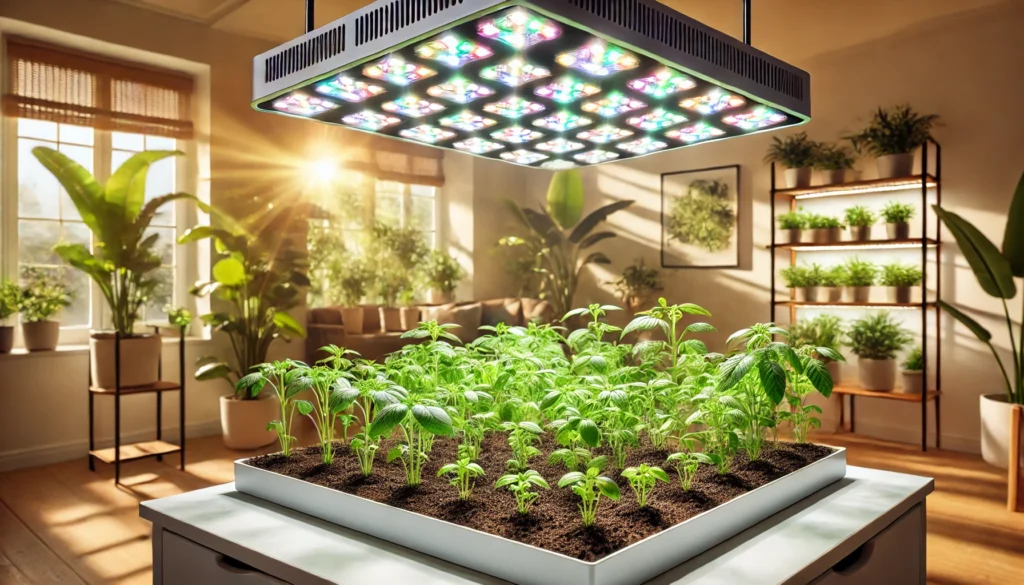
Best Grow Lights for Seed Germination: Top Picks for Healthy Seedlings
Starting seeds indoors can be an exciting and rewarding way to grow your garden, but ensuring they get the right amount of light is crucial for success. If you’re wondering about the best grow lights for seed germination, you’re in the right place. Proper lighting not only helps your seeds sprout faster, but it also promotes strong, healthy seedlings that are ready for transplanting. In this article, we’ll explore the top grow light options designed to give your seeds the perfect environment for germination, helping you take your indoor gardening to the next level.
Table of Contents
ToggleWhy Proper Lighting Matters for Seed Germination 🌱💡
When starting seeds indoors, light is one of the most important factors for success. Proper lighting helps seeds germinate quickly and grow into strong, healthy seedlings. Without it, your plants may struggle to thrive. Here’s why it matters:

Light Triggers Germination 🌟
For many seeds, light is a key signal to start the germination process. Some seeds need light to activate enzymes that help them sprout. Without the right light, germination may be delayed or even fail.
Supports Photosynthesis 🌞
Once your seeds sprout, they need photosynthesis to grow. This process turns light into energy, helping seedlings produce food for themselves. Without enough light, seedlings become weak, and their growth slows down.
Prevents Leggy Growth 🌿
When seedlings don’t get enough light, they stretch towards it in search of more energy. This causes them to grow tall and spindly, a condition known as “leggy growth.” These seedlings are weak and less likely to survive.
Helps Root Development 🧑🌾
Good light encourages healthy root systems. Roots absorb nutrients and water, which are essential for seedling strength. If seedlings don’t get enough light, their root development can be poor, affecting overall growth.
In short, providing proper lighting is essential for giving your seeds the best start. It ensures strong roots, healthy leaves, and robust plants that are ready to thrive in your garden! 🌸
Key Factors to Consider When Choosing a Grow Light for Seed Germination 🌱💡
Choosing the right grow light is crucial for seed germination. Here are the key factors to consider to ensure your seedlings thrive:
1. Light Spectrum 🌈
The light spectrum refers to the different colors of light that plants use for growth. Full-spectrum lights are best for seedlings because they mimic natural sunlight. Look for lights that provide a balance of blue light (for strong leaves and stems) and red light (for healthy roots and flowering).
2. Light Intensity 💪
Intensity is how strong the light is. Seedlings need high light intensity for healthy growth but not too much that it burns them. Choose a grow light with adjustable intensity, so you can control how bright the light is for your plants.
3. Distance from Plants 📏
The distance between the grow light and seedlings is important. Place your light too close, and it might overheat your plants; too far, and your seedlings won’t get enough light. Generally, keep lights about 2–4 inches above small seedlings, and adjust as they grow taller.
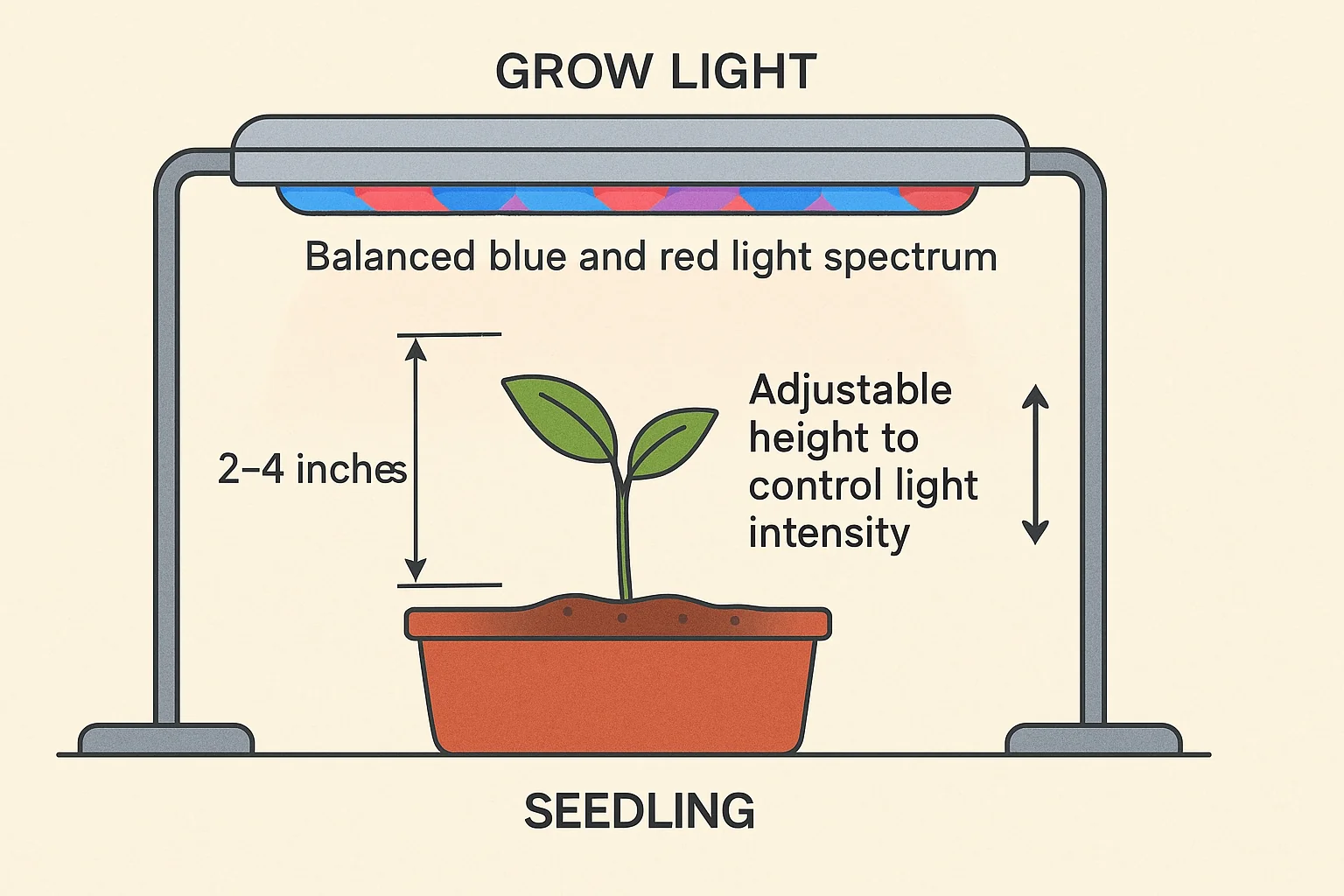
4. Duration of Light Exposure ⏰
Seedlings need around 12–16 hours of light per day. Use a timer to ensure a consistent light cycle, which helps them grow strong. Don’t forget to provide a dark period (8–12 hours) for rest.
5. Energy Efficiency ⚡
Look for LED grow lights if you’re after an energy-efficient option. They use less power, last longer, and provide great light for seedlings without overheating. While LED lights may cost more upfront, they save you money in the long run.
By keeping these factors in mind, you’ll create the perfect lighting setup for your seedlings and give them the best chance to grow strong and healthy! 🌟🌿
Types of Grow Lights for Seed Germination 🌱💡
When choosing a grow light for seed germination, it’s important to understand the different types available. Each type has its own benefits and drawbacks. Let’s break them down:
1. Fluorescent Grow Lights 💡✨
Pros:
- Affordable and widely available.
- Low heat output, making them safe for seedlings.
- Good for small spaces and beginners.
- Great for seeds that need moderate light.
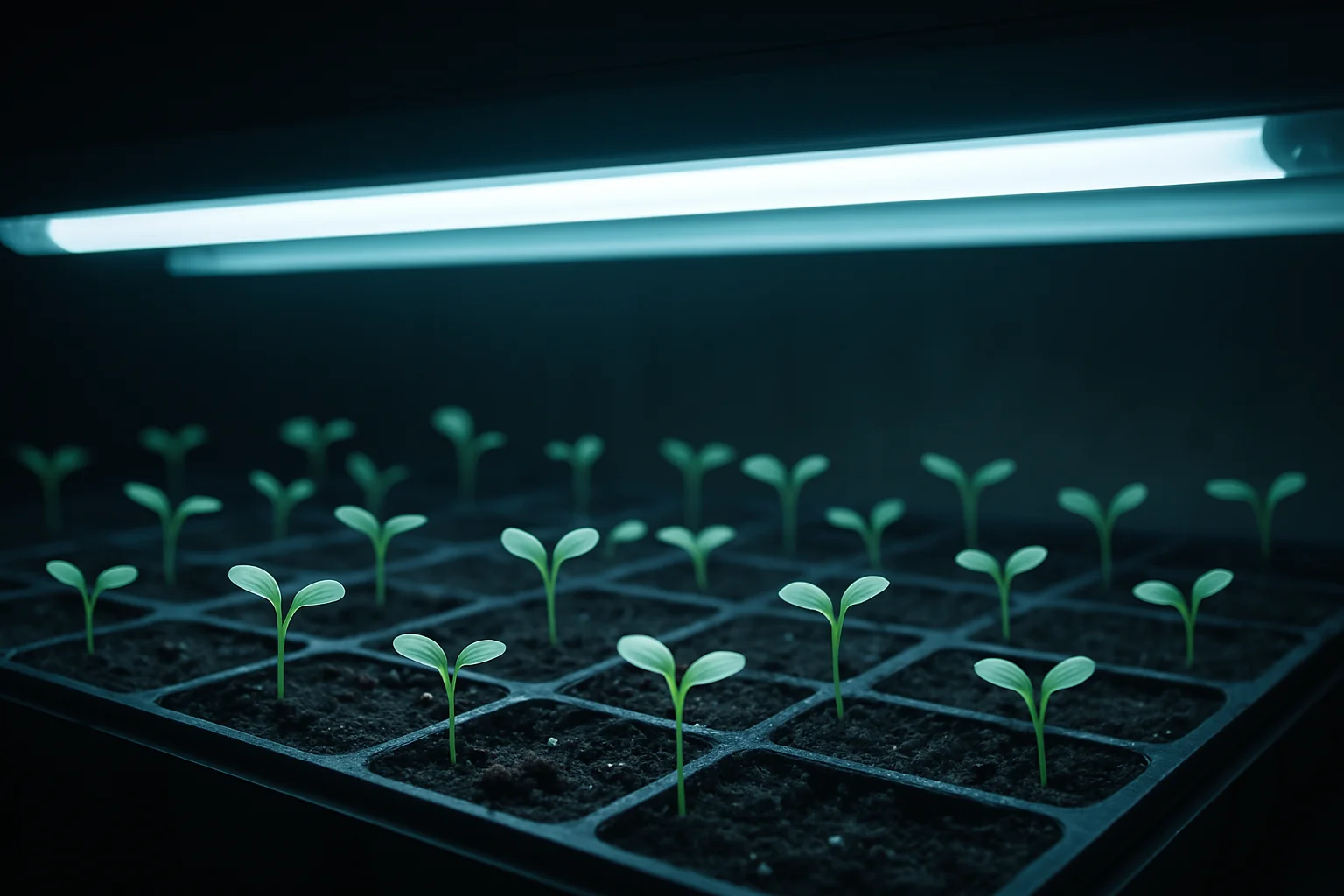
Cons:
- Less efficient than LEDs.
- Need more frequent bulb replacements.
Best For: Small indoor setups and budget-friendly gardening.
2. LED Grow Lights 🌟
Pros:
- Energy-efficient and cost-effective in the long run.
- Long lifespan—they can last up to 50,000 hours.
- Offer full-spectrum lighting, which is ideal for all growth stages.
- Produce low heat, so seedlings won’t burn.
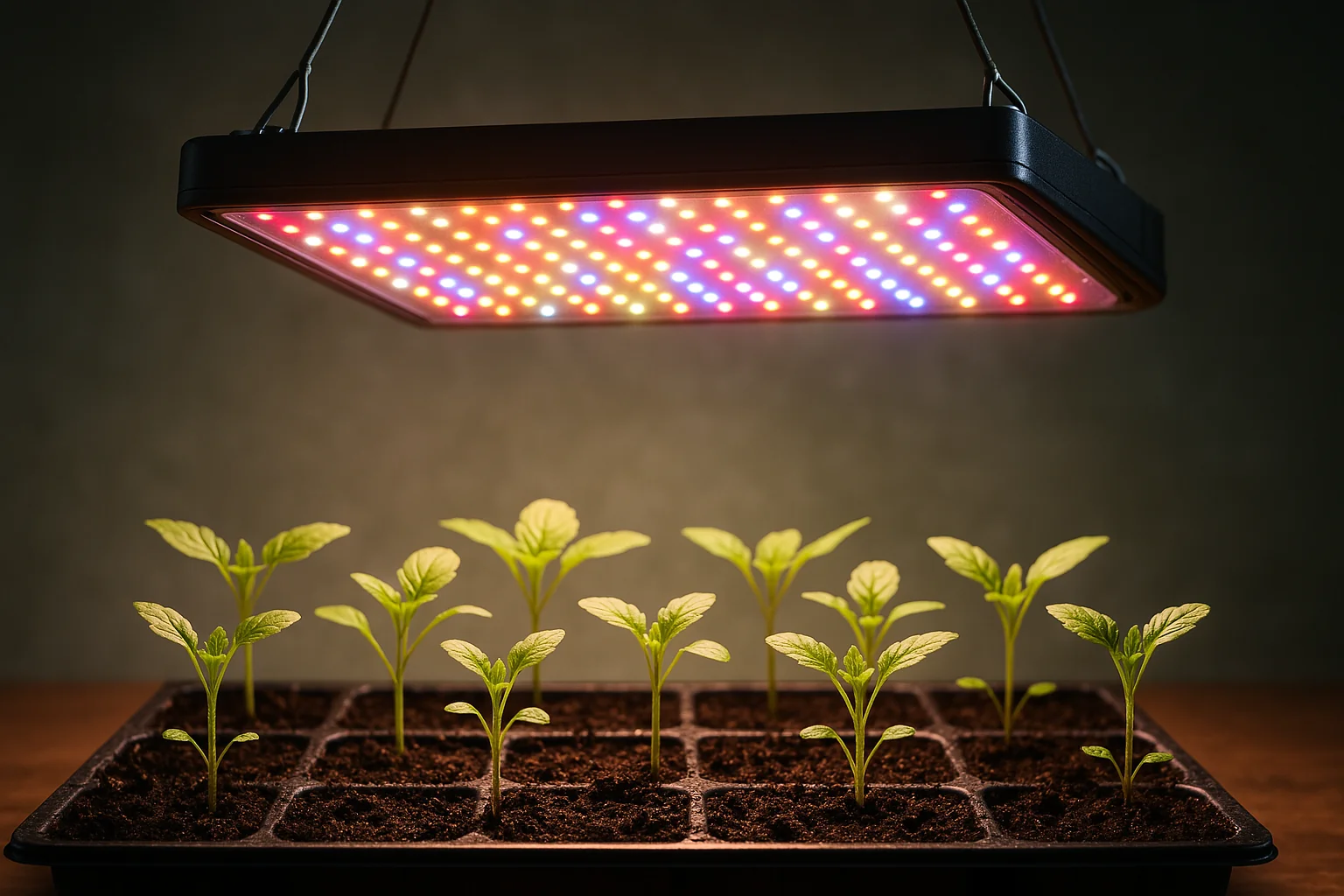
Cons:
- Higher initial cost, but they pay off over time.
Best For: Larger setups, serious gardeners, and anyone looking for long-term efficiency.
3. Incandescent & Halogen Grow Lights 🔥
Pros:
- Cheap upfront.
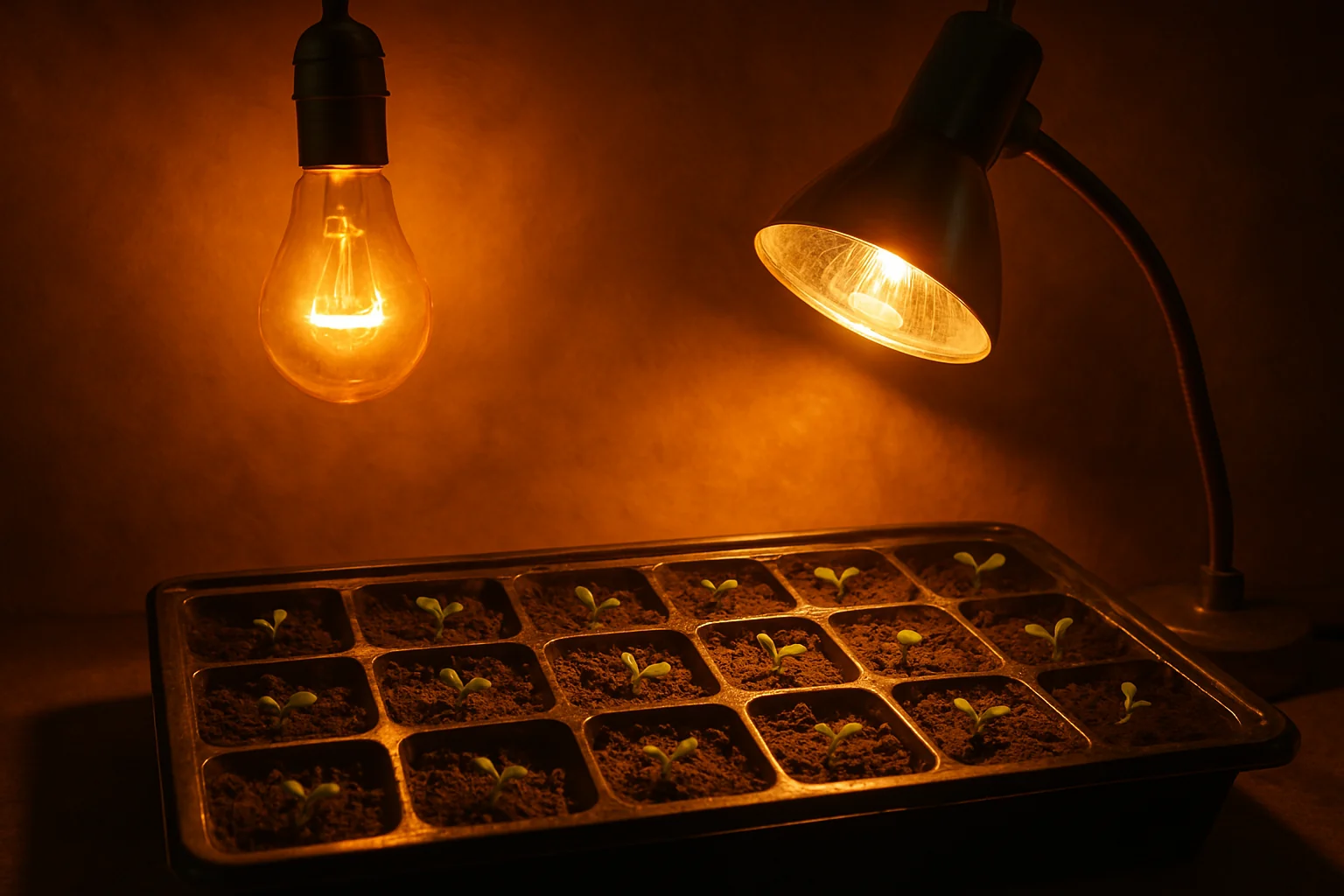
Cons:
- High heat production, which can burn seedlings.
- Inefficient—they waste energy and don’t provide the correct spectrum for plant growth.
- Short lifespan compared to other options.
Best For: Not recommended for seed germination.
4. High-Intensity Discharge (HID) Lights 🔆
Pros:
- Powerful light—great for large grow areas.
- Very efficient for flowering and fruiting stages.
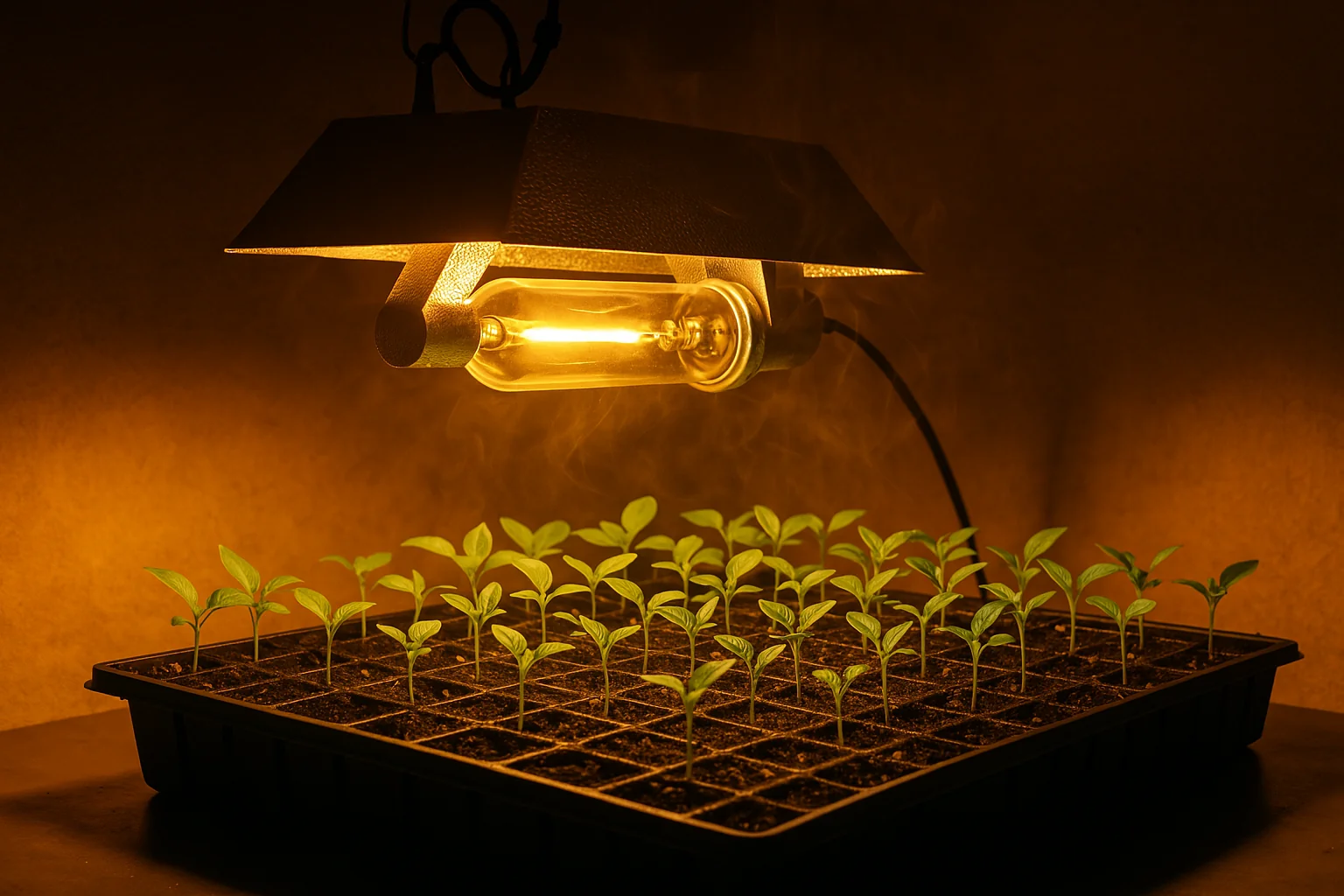
Cons:
- Expensive and require special equipment like a ballast.
- Produce a lot of heat, which could be harmful to seedlings in smaller spaces.
Best For: Large-scale or professional indoor gardening (not ideal for beginners or small spaces).
Which One Should You Choose? 🤔
- If you’re just starting and have a small space, fluorescent lights are a great budget-friendly option.
- For those wanting efficiency and long-term savings, LED lights are the way to go.
- HID lights are best suited for advanced growers with larger setups.
Choosing the right grow light will help your seedlings thrive and give them the best start possible! 🌱
Top Picks for the Best Grow Lights for Seed Germination 🌱💡
Choosing the right grow light is key to giving your seeds the best start. Here are some top-rated options that will ensure your seedlings get the light they need to thrive:
1. LBW LED Grow Light with Stand 🌟
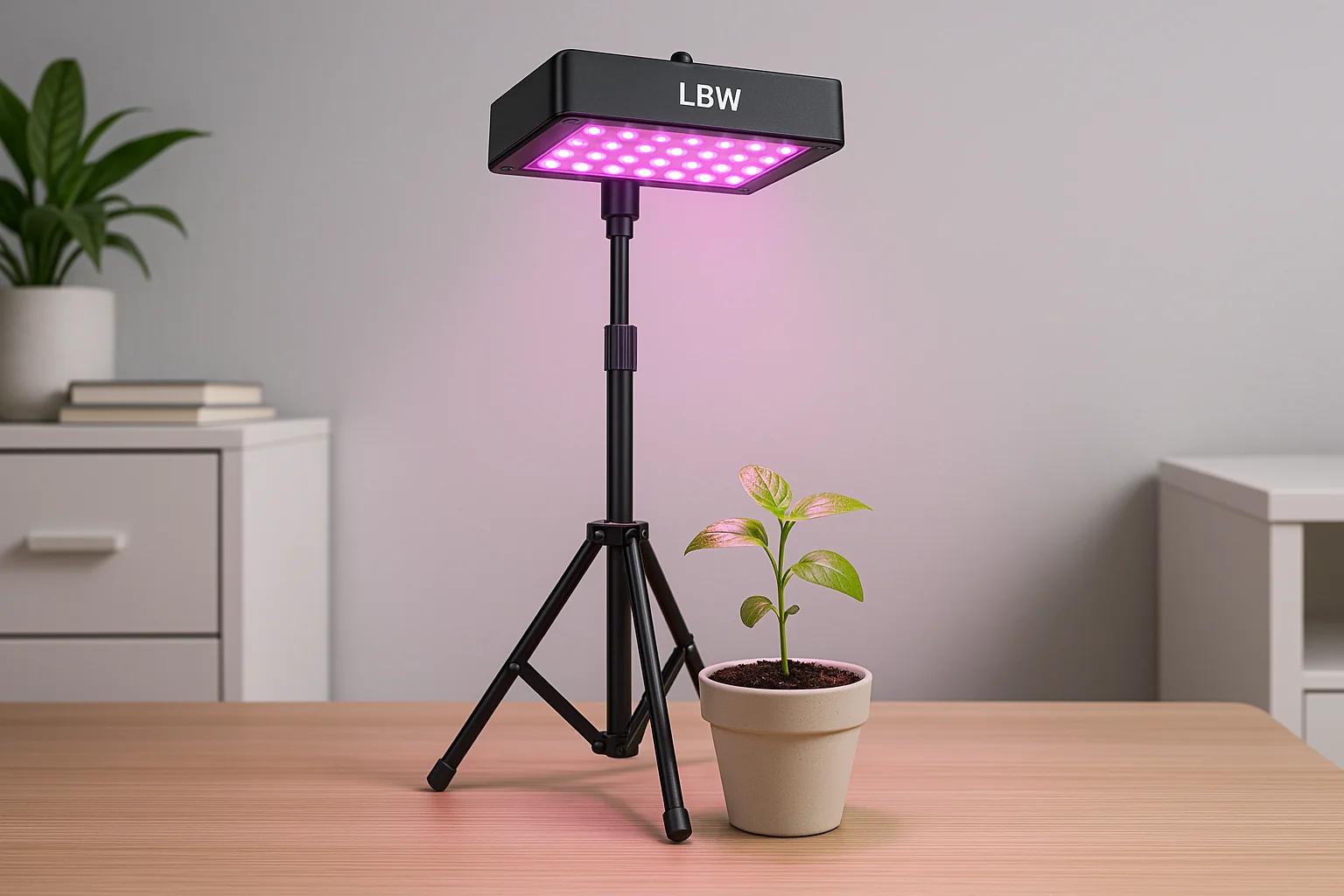
- Type: Full-spectrum LED
- Why It’s Great: This compact and adjustable grow light provides the full spectrum of light, perfect for seedling growth. Its tripod stand allows for easy height adjustments, making it great for all plant stages. 🌿
- Key Features: Adjustable stand, energy-efficient LED, compact design.
- Best For: Small to medium indoor setups.
2. Leoter 4 Head Grow Light with Timer ⏰
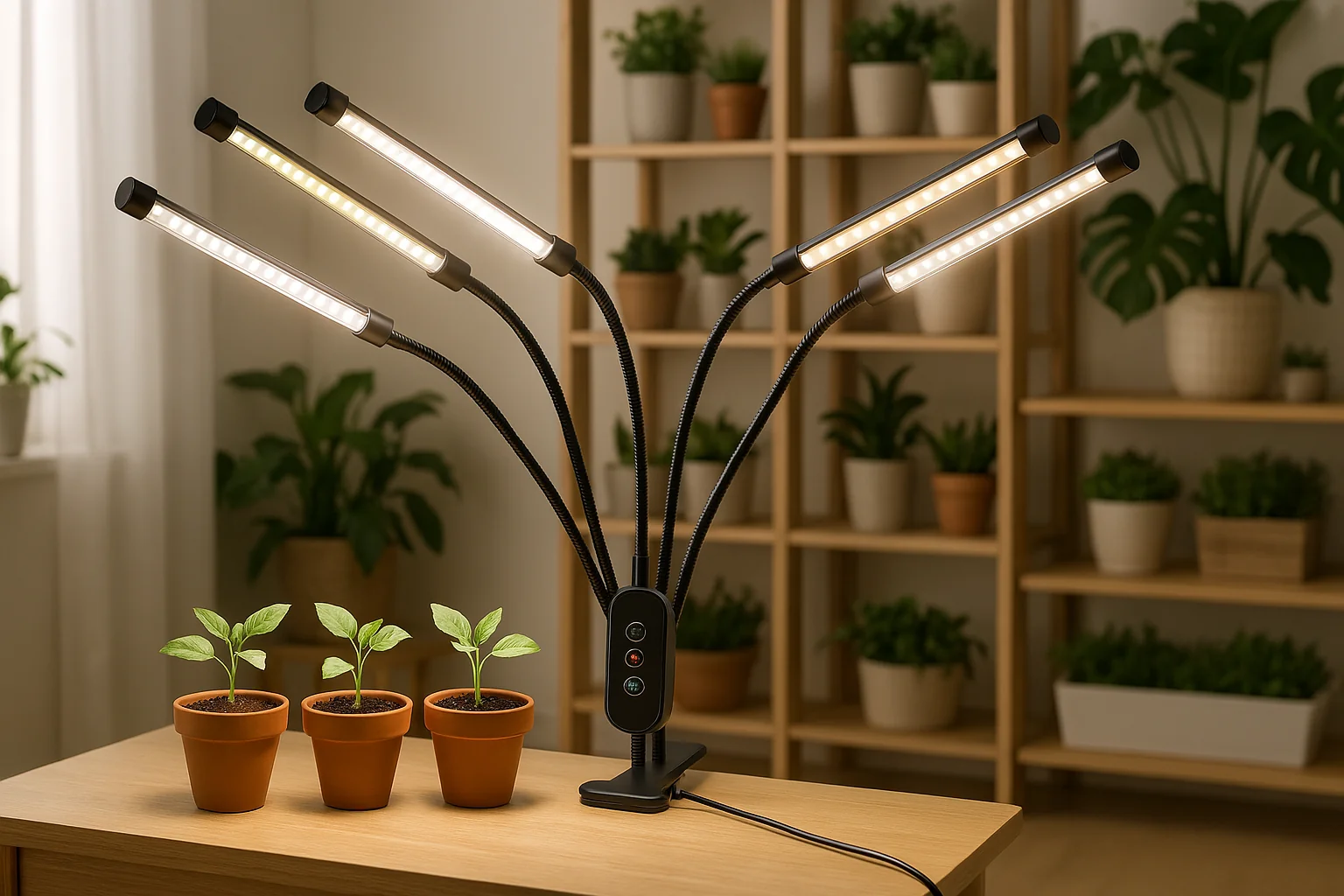
- Type: Full-spectrum LED
- Why It’s Great: With four flexible arms and a built-in timer, this light offers convenience and versatility. You can set it to different timers (3, 9, or 12 hours), ensuring your seedlings get just the right amount of light. 🌞
- Key Features: Four flexible arms, adjustable brightness, timer function.
- Best For: Indoor gardeners who need flexibility and consistency.
3. iGrowtek LED Grow Light 🌿
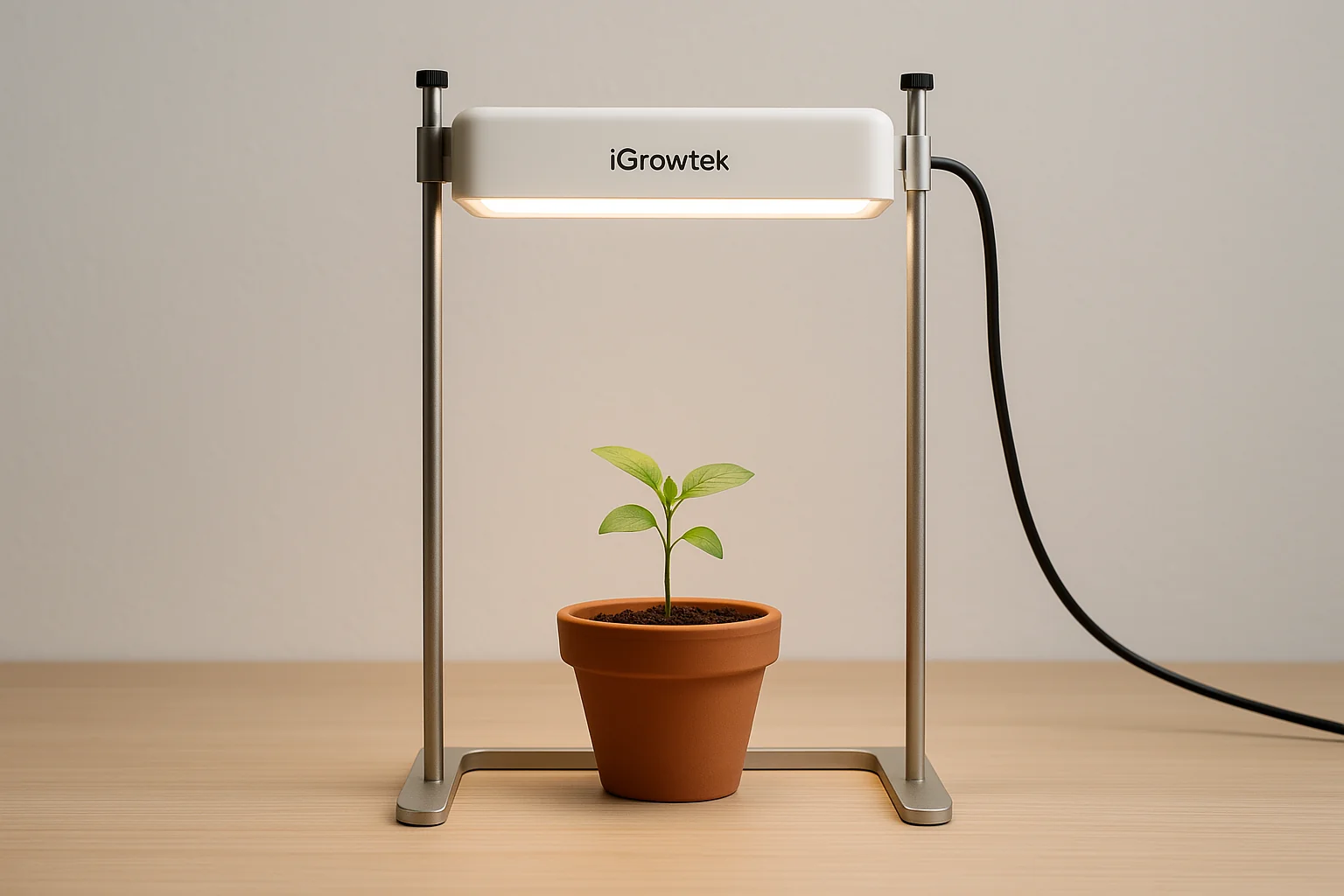
- Type: Full-spectrum LED
- Why It’s Great: This compact light is perfect for small spaces, offering an efficient way to promote seedling growth without taking up much room. It’s simple to set up and adjust. 🌱
- Key Features: Easy setup, adjustable height, low power consumption.
- Best For: Small spaces and beginner gardeners.
4. Gpoty Seed Starter Tray Kit with LED Lights 🌸
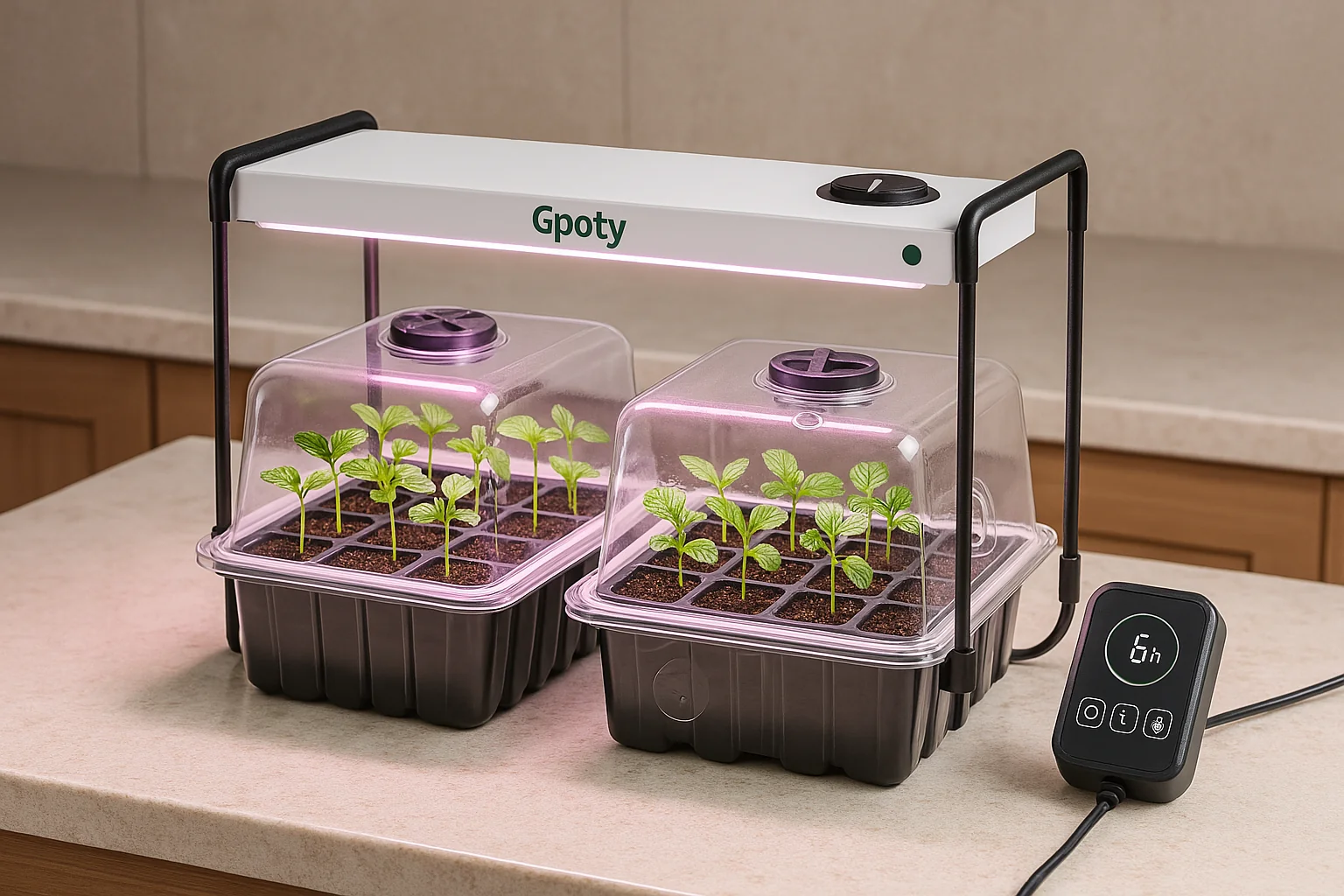
- Type: LED light integrated with seed starter tray
- Why It’s Great: This all-in-one kit includes LED lights, seed trays, humidity domes, and a timer, making it perfect for those who want everything in one package for successful seed germination. 🌿
- Key Features: Complete kit, built-in LED lights, adjustable humidity.
- Best For: Beginners who want a convenient, complete seed-starting solution.
These grow lights are designed to support strong, healthy seedlings by providing them with the right light at the right time. Whether you’re just starting or expanding your indoor garden, these top picks will help your seeds thrive! 🌱💡
How to Set Up Your Grow Light for Seed Germination 🌱💡
Setting up your grow light correctly is crucial to ensuring your seedlings get the best start. Follow these simple steps to create the perfect environment for germination:
1. Choose the Right Location 📍
Place your grow light in a location where your seedlings will get even, consistent light. A south-facing window works great, but if you’re growing indoors, ensure the light is placed above the seedlings to prevent them from getting too leggy. 🌞
2. Set the Correct Height 📏
For seedlings, distance matters! Place your grow light about 2–4 inches above the seedlings for maximum light intensity. As they grow, you can raise the light to prevent burning or stretching. Keep an eye on the height to adjust as your seedlings get taller. 🌱
3. Use a Timer ⏰
Seedlings need a consistent light schedule. Set up a timer to automatically turn the grow light on and off. Aim for 12–16 hours of light per day to mimic natural daylight hours, and don’t forget to provide a dark period for proper rest. 🌙
4. Maintain Proper Ventilation 💨
Good air circulation is key for healthy seedlings. Make sure your growing area has some ventilation to avoid overheating and humidity buildup. Consider a small fan nearby to keep the air moving and help prevent mold or fungus. 🍃
5. Monitor Temperature 🌡️
Keep the temperature in check! Most seedlings prefer 65–75°F (18–24°C). If the area gets too hot from the grow light, it can stress the seedlings. Use a thermometer to ensure the room temperature stays within the ideal range. 🌞
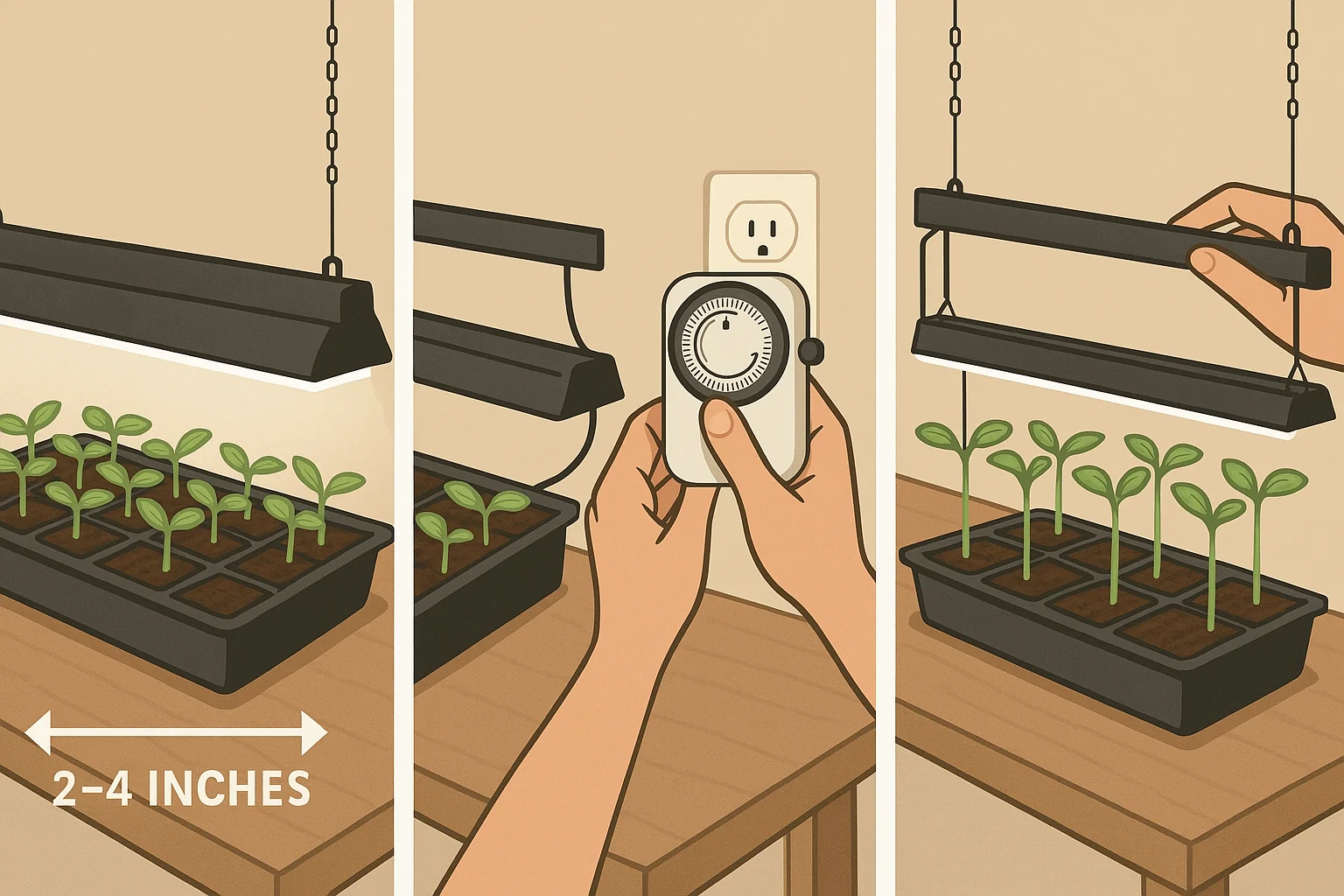
With these simple steps, you’ll create the perfect setup for your seeds to germinate and grow into strong, healthy plants. Happy growing! 🌱✨
Tips for Maximizing Seedling Health with Grow Lights 🌱💡
To ensure your seedlings grow strong and healthy under grow lights, here are some essential tips:
1. Monitor Temperature and Humidity 🌡️💧
Seedlings thrive in a consistent temperature between 65–75°F (18–24°C). Too much heat from your grow light can cause stress, so keep an eye on the temperature. Also, ensure humidity levels stay balanced—around 50-70% is ideal. If it’s too dry, consider adding a small humidifier or misting your plants occasionally. 🌿
2. Rotate Seedlings Regularly 🔄
To encourage even growth, rotate your seedlings every few days. This ensures that all sides of the plant receive equal light exposure and prevents them from becoming lopsided or “leggy.” 🌱
3. Keep Lights Clean ✨
Dust and dirt can block light intensity and reduce the effectiveness of your grow light. Regularly clean your grow light and reflectors to keep them working at full capacity. A simple wipe with a soft cloth should do the trick! 🌟
4. Adjust Light Height as Seedlings Grow 📏
As your seedlings get taller, you’ll need to adjust the height of your grow light. Start with the light about 2–4 inches above your seeds, and gradually raise it as the plants grow. This helps prevent burning and ensures that seedlings get just the right amount of light. 🌞
5. Watch for Signs of Stress 🚨
Keep an eye on your seedlings for signs of stress, like yellowing leaves, slow growth, or leggy stems. These can indicate that your seedlings aren’t getting enough light or that the light is too intense. Adjust the light setup as needed to keep your plants healthy. 🌿
6. Use Light Timers for Consistency ⏰
Seedlings need a consistent light cycle to thrive. Set up a timer to ensure they get 12-16 hours of light per day, followed by 8–12 hours of darkness. This mimics natural day/night cycles and helps plants grow strong and healthy. 🌙
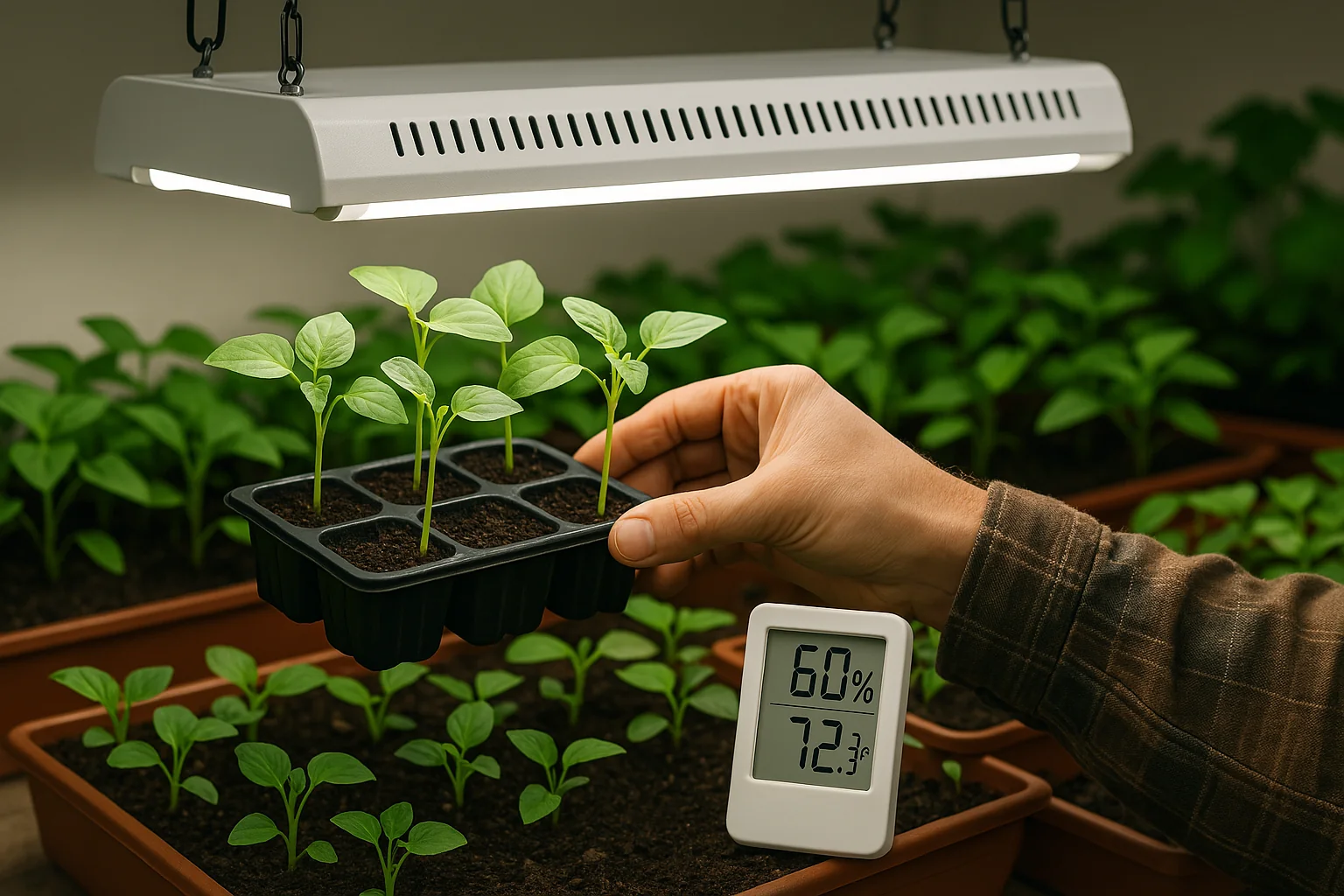
By following these tips, you’ll create the perfect environment for your seedlings to thrive, ensuring they grow strong and healthy with the help of your grow light! 🌸💚
Common Mistakes to Avoid with Grow Lights 🌱❌
Using grow lights is a great way to ensure your seedlings thrive, but there are a few common mistakes you’ll want to avoid. Here’s what to watch out for:
1. Using the Wrong Type of Light Bulb 💡
Many beginners make the mistake of using incandescent or halogen bulbs for seedling growth. These bulbs produce too much heat and don’t provide the right light spectrum. Stick with fluorescent or LED grow lights for the best results. 🌟
2. Placing the Light Too Close 🔥
Placing your grow light too close to seedlings can cause them to burn or dry out. Keep the light about 2–4 inches above small seedlings, and raise it as they grow. Monitor them closely to avoid damage! 📏
3. Not Adjusting Light Height as Plants Grow 📏
As seedlings mature, their light needs change. Not raising the light as they grow taller can lead to leggy, weak plants. Adjust the light height regularly to ensure your seedlings continue to get the right amount of light. 🌱

4. Forgetting About Light Cycles ⏰
Seedlings need a consistent light/dark cycle to grow properly. Giving them light 24/7 or leaving them in the dark too long can stress them out. Set a timer for 12-16 hours of light and 8-12 hours of darkness per day. 🌞🌙
5. Overheating Your Seedlings 🔥
Too much heat from your grow light can dry out seedlings or stunt their growth. Ensure proper ventilation and monitor temperature to avoid overheating. Keep it cool, especially in small spaces! 🌬️
6. Not Cleaning the Lights Regularly ✨
Dust and grime can build up on your grow light, reducing its effectiveness. Regularly clean your lights and reflectors to maintain proper light intensity and keep your seedlings healthy. 🌟
Avoiding these common mistakes will help your seedlings get the best start possible, leading to strong, healthy plants ready for the garden! 🌱💚
Final Thought🌱💡
Choosing the best grow lights for seed germination is key to starting your gardening journey on the right foot. By understanding the importance of light in the early stages of plant growth and selecting the right type of light for your needs, you set your seedlings up for success. Whether you choose fluorescent, LED, or other lighting options, ensuring proper light spectrum, intensity, and duration is crucial for strong, healthy seedlings that will thrive as they grow.
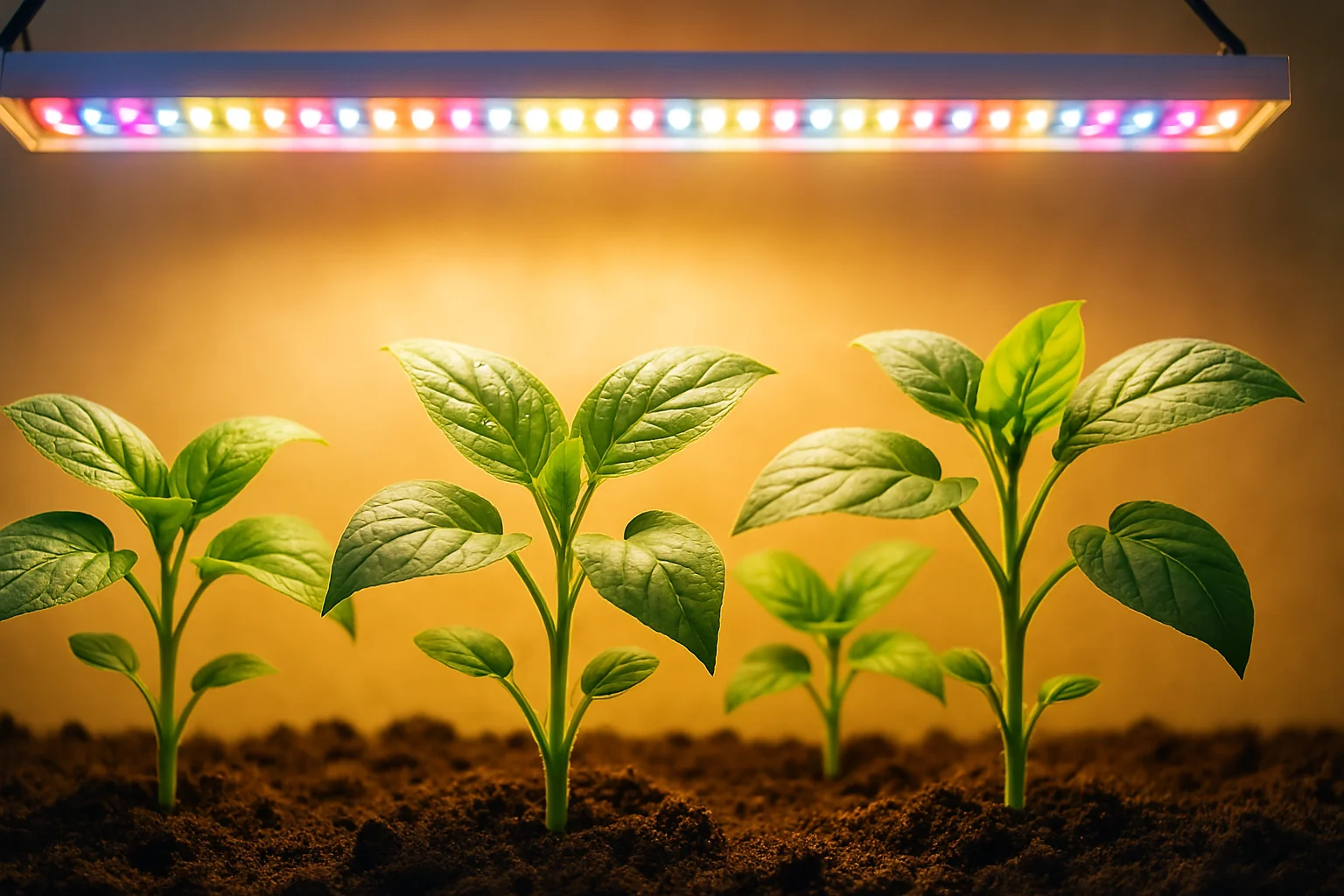
Remember, the right grow light not only enhances germination but also contributes to the long-term health of your plants. With the recommendations and tips shared in this guide, you’re now equipped to make an informed decision and start growing your seedlings with confidence. Happy gardening!
Frequently Asked Questions (FAQ)
Why do I need grow lights for seed germination?
Grow lights are essential for seed germination, especially when growing indoors or during the off-season. They provide the necessary light spectrum that seeds need to sprout and grow strong, healthy seedlings, mimicking natural sunlight conditions that may not be available indoors.
What type of grow light is best for seed germination?
The best grow lights for seed germination are typically fluorescent lights (T5 or T8) and LED grow lights. These options offer the right light spectrum, energy efficiency, and sufficient light intensity for seedlings to grow without overheating.
How many hours a day should I use grow lights for germinating seeds?
For optimal seed germination, your grow lights should be on for about 12-16 hours a day. After seeds have sprouted and seedlings start growing, you can reduce light exposure to around 12 hours per day, simulating natural light cycles.
Can I use regular LED or fluorescent lights for seed germination?
While regular LED or fluorescent lights may provide some light for your seeds, they typically don’t offer the full spectrum of light needed for optimal seedling growth. Specialized grow lights are designed to provide the correct balance of light that promotes healthy germination.
How far should grow lights be from seedlings?
The distance between your grow lights and seedlings depends on the type of light used. For fluorescent lights, they should be positioned about 2-4 inches above the seedlings. For LED lights, a range of 6-12 inches is ideal. Always monitor your plants for signs of stretching or burning to adjust accordingly.
Can I use grow lights for plants beyond seed germination?
Yes, grow lights can be used beyond seed germination to support healthy plant growth. Full-spectrum LED lights and fluorescent lights are perfect for providing the light required for seedlings to mature into healthy plants.
What are the benefits of using LED grow lights for seed germination?
LED grow lights are energy-efficient, long-lasting, and offer a full spectrum of light that can be adjusted for various stages of plant growth. They emit less heat, reducing the risk of overheating, and are ideal for both small and large indoor growing setups.
Can I overexpose my seeds to grow lights?
Yes, overexposure to grow lights can stress seedlings, leading to problems like leggy growth or heat damage. It’s important to provide your seeds with the right amount of light each day (12-16 hours) and to ensure proper light distance to avoid damaging the plants.
